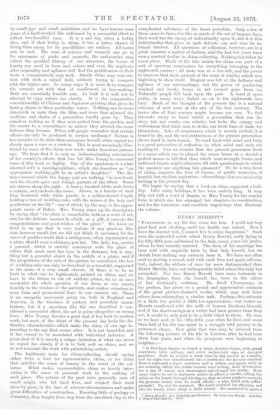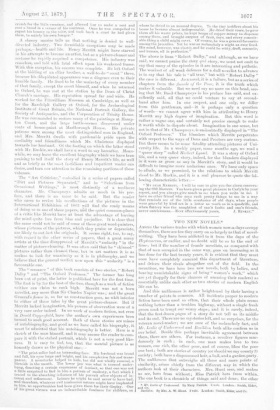HENRY MERRITT.* " Evxarramo iu my life has conic too
late. I could not buy good food and clothing, until my health was ruined. Now I have the dearest wife, I cannot live to enjoy happiness." Such were the sorrowful words which Henry Merritt, sadly dying in his fifty-fifth year, addressed to the lady, many years his junior, whom he had recently married. The story of his marriage has been told with exquisite taste by that lady herself, but we shrink from making any extracts from it. We have not often read so moving a record, told with such firm and quiet self-con- trol; indeed, the widows of men far more distinguished than Henry Merritt, have not unfrequently failed where this lady has succeeded. Nor has Henry Merritt been more fortunate in his biographer, than she herself has been in the editor of her husband's writings. Mr. Basil Champneys, in his preface, has given us a genial and appreciative estimate of the great picture-cleaner's works, which may well deter others from attempting a similar task. Perhaps this estimate is a little too genial, a little too appreciative,—but better so. Merritt overflowed with the milk of human kindness himself, and if his shortcomings as a writer had been greater than they are, it would be only just to be a little blind to them. He was, as we have said, in his fifty-fifth year when he died, and more than half of his life was spent in a struggle with penury in its grimmest shape. How grim that was, may be inferred from the following picture of his life in London, after he had been there four years, and when his prospects were beginning to brighten :—
" Iu Red Lion Square he found a largo, desolate house, with grand staircases, lofty ceilings, and every melancholy sign of decayed grandeur. Bore he ranted a room that by day served as a studio, and by night was transformed into a bedroom ; for he only unrolled from a cupboard a straw mattress and a pillow, and again, early in the morning, before the richer tenants were stiriug, stole downstairs for a lug of water, and rearranged and cleaned his studio. Hero many nights he sat in darkness, unable to afford a candle, sifting the ashes on his hearth through his fingers, that no atom might be wasted; the greatest luxury that he could afford,—a pipe filled with coffee- grounds l No, not the greatest. Hia heart yearned for affection, and into the lonely room crept a little mouse. He contrived to spare a • henry dferrilt : Art, Criticism, and Romance. By Anus. Lea Merritt. London* C. Kogan Paul sad Co. 1870.
crumb for the little creature, and allowed her to make a nest and rear a brood in a corner of his mattress. Once he was compelled to regret his bounty to the mice, and took back a crust he had given them, to satisfy his own hunger."
A cheery maxim tells its that nothing is denied to well- directed industry. Two formidable exceptions may be made perhaps,—health and life. Henry Merritt might have starved in his attempts to become an artist, but as a picture-cleaner and restorer he rapidly acquired a competence. His industry was ceaseless, and told with fatal effect upon his weakened frame. With this exception, his success was complete. He left Oxford at the bidding of an elder brother, a well•to-do " scout " there, because his dilapidated appearance was a disgrace even to their humble family. He lived to be the mainstay of every member of that family, except the scout himself, and when he returned to Oxford, he was met at the station by the Dean of Christ Church's carriage. His reputation spread far and wide. He worked for the Fitzwilliain Museum at Cambridge, as well as for the Randolph Gallery at Oxford, for the Archaeological Institute of Great Britain, the National Portrait Gallery, the Society of Antiquaries, and the Corporation of Trinity House.
He was commanded to restore many of the paintings at Hemp- ton Court, and the large battle-scenes discovered under coats of house-paint at Marlborough House. His private patrons were among the most distinguished men in England,
and Mrs. Merritt dwells with pardonable pride upon the cordiality and friendliness which Mr. Gladstone displayed towards her husband. Of the footing on which the latter stood with Mr. Ruskin,we shall have a word to say hereafter. Mean- while, we may leave the excellent biography which we have been praising to tell itself the story of Henry Merritt's life, as well
and as briefly as the most fastidious and impatient reader can desire, and turn our attention to the remaining portions of these volumes.
The " Art Criticism," embodied in a series of papers called "Dirt and Pictures Separated," and in " Selections from Occasional Writings," is most distinctly of a mediocre character. Mr. Champneys admits as much in his pre- face, and there is no more to be said. But the reader who cares to revive his recollections of the pictures in the International Exhibition of 1863 will find the ready means of doing so in one of these papers, an the quiet common-places of a critic like Merritt have at least the advantage of leaving the mind quite free from bias and prejudice. It is clear that the same could not be said of some of those great word-painters, whose pictures of the pictures, which they praise or depreciate, are likely to out-last the originals. It seems right, too, to say, with regard to the other series of papers, that a great many artists at the time disapproved of Merritt's "audacity " in the matter of picture-cleaning. It was often said that he " skinned" pictures rather than cleaned them, but in art matters it is as useless to look for unanimity as it is in philosophy, and we believe that the general verdict now upon this " audacity " is a favourable one.
The " romance " of this book consists of two stories, "Robert Dalby " and "The Oxford Professor." The former has long been out of print, the latter is published here for the first time. The first is by far the best of the two, though as a work of fiction neither can claim to rank high. Merritt was not a born
novelist, any more than Sir Charles Napier was ; and the great General's fiasco is, so far as construction goes, no whit inferior
to either of these tales by the great picture-cleaner. But if Merritt lacked imagination, his powers of observation were of a very rare order indeed. In no work of modern fiction, not even
in David Oorpeifield, have the author's own experiences been turned to such good account. Both of these stories are mines
of autobiography, and good as we have called his biography, it must be admitted that his autobiography is better. Here is a sketch of the man himself, and it may amuse the reader to com- pare it with the etched portrait, which is not a very good like- ness. It is easy to feel, too, that the mental picture is as honestly drawn as the physical one :--
" The print-seller had an interesting face. Ifis forehead was broad and full, his eyes large and bright, and his complexion fair and trans- parent. A moustache helped to hide, but did not wholly conceal, a blemish in the mouth. The lower jaw was what is termed under- hung, denoting a certain coarseness of instinct, so that one was not a little surprised to find in him a pattern of modesty, a fact which I traced to the absorbing influence of his pursuit after objects of in- terest and refinement. Leisure ho might be said never to have had, and therefore, whatever evil tendencies nature might have implanted in him, no opportunities had been given them for their display. One of his groat virtues was an indescribable fondness for children, on
whom he doted to en unusual degree. To the tiny toddlers about his house he became almost indispensable. He dried their tears, ho gave them all his waste prints, he kept heaps of copper-money to dispense among them, and brought cargoes of fruit, toys, and every conceiv- able thing n child might covet, Of course, he was a general favourite among the juveniles. Yet he was as melancholy a wight as ever lived. Bis mind, however, was elastic, and he could be witty, droll, sarcastic, and human, all in perfection."
The above is from " Robert Dolby," and although, as we have said, we cannot praise the story quit story, we must not omit to say that many of the episodes in it are interesting and pathetic.
The weakest of all weak defences for a dull novelist to advance is to say that his tale is " all true," but with " Robert Dalby " the ease is different. As a novel, it is a failure, but as a series of
chapters from the Annals of the Poor, it is the truth which makes it valuable. But we need say no more ou this head, see- ing that Mr. Basil Champueys in his preface has said, and ex-
cellently said, all that we could venture to say at second- hand after him. In one respect, and one only, we differ from this gentleman, and—it is perhaps only a question of words—we cannot agree with him in attributing to Henry Merritt any high degree of imagination. But this word is rather a vague one, and certainly not precise enough to make it worth while to dispute about. Imagination in one sense, but not in that of Mr. Cha.mpneys, is undoubtedly displayed in " The Oxford Professor." The blunders which Merritt perpetrates with respect to the ways of Dons and Proctors are very curious.
lint there seems to be sonic fatality attending pictures of Uni- versity life. In a weekly paper, some months ago, we read a " queer story " called Herbert Lyssel. It was a story of Oxford life, and a very queer story, indeed, for the blunders displayed in it were as gross as any in Merritt's story, and it would be difficult to imagine more audacious ones. We have only space to allude, as we promised, to the relations to which Merritt
stood to Mr. Ruskin, and it is a real pleasure to quote the fol- lowing characteristic letter :-
" Mr DEAR MERRITT, --I will be sure to give you due alarm concern- ing the Old Masters. You have given great pleasure to Carlyle by your report, and you always give much to maim when you write to me. I have no other friend who says such pretty things to me in a way that reminds one of the little courtesies of old days, when people were graceful by kind act in a letter as much as in a quadrille, and when flattery was the naughtiest of one's faults and one's friends, never carelessness.—Ever affectionately yours, J. RUSKIN."































 Previous page
Previous page